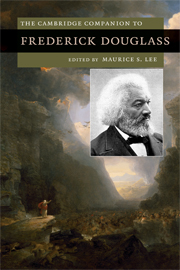Book contents
- Frontmatter
- Introduction
- 1 Douglass’s Self-Making and the Culture of Abolitionism
- 2 Identity in the Autobiographies
- 3 Douglass as Orator and Editor
- 4 Crisis and Faith in Douglass’s Work
- 5 Violence, Manhood, and War in Douglass
- 6 Human Law and Higher Law
- 7 Sentimental Douglass
- 8 Douglass among the Romantics
- 9 Douglass’s Black Atlantic: Britain, Europe, Egypt
- 10 Douglass’s Black Atlantic: The Caribbean
- 11 Douglass, Ideological Slavery, and Postbellum Racial Politics
- 12 Born into Slavery: Echoes and Legacies
- Guide to Further Reading
- Index
12 - Born into Slavery: Echoes and Legacies
Published online by Cambridge University Press: 28 July 2009
- Frontmatter
- Introduction
- 1 Douglass’s Self-Making and the Culture of Abolitionism
- 2 Identity in the Autobiographies
- 3 Douglass as Orator and Editor
- 4 Crisis and Faith in Douglass’s Work
- 5 Violence, Manhood, and War in Douglass
- 6 Human Law and Higher Law
- 7 Sentimental Douglass
- 8 Douglass among the Romantics
- 9 Douglass’s Black Atlantic: Britain, Europe, Egypt
- 10 Douglass’s Black Atlantic: The Caribbean
- 11 Douglass, Ideological Slavery, and Postbellum Racial Politics
- 12 Born into Slavery: Echoes and Legacies
- Guide to Further Reading
- Index
Summary
For several generations, students and scholars of African American history and literature (and those of US history and literature more broadly defined) have considered Frederick Douglass’s 1845 Narrative of the Life of Frederick Douglass, An American Slave, Written by Himself to be something of a foundational text. Although it is not the first narrative written by a former slave, it has long been the narrative to which teachers and students of African American autobiography and history turn to illustrate the impact of “the peculiar institution” upon virtually every aspect of the lives of enslaved people and to display their capacity for resistance. In part, the text has earned this reputation because of Douglass’s legendary stature as a statesman, orator, abolitionist, author, editor, and reformer. And in part, the Narrative has achieved its elevated position in the canon of American letters because it is a rhetorical tour de force; its emotional complexity, memorable characterizations, and vivid imagery testify eloquently to the human capacity to triumph over oppression and illiteracy.
Moreover, many of us who teach and write about American literature admire Douglass’s Narrative because it does a lot of work for us. Not only does it engage concerns with which his contemporaries wrestled, including the meaning of freedom and American democracy, and the contradictions of American religion. It also anticipates themes that have recurred in twentieth- and now twenty-first-century literature, including the relationship between narrative and political authority, the mutually constitutive nature of constructions of race and gender, the relationship between self-making and national ideologies, and the status of the black body within the institution of antebellum slavery.
- Type
- Chapter
- Information
- The Cambridge Companion to Frederick Douglass , pp. 173 - 182Publisher: Cambridge University PressPrint publication year: 2009

